In total there are 15 Japanese National Holidays throughout the year. Let's find out when they are, what they are and why they are so…
2024 CHINESE NATIONAL HOLIDAYS
Below is a list of the 2024 Chinese National Holidays, as well as the 2025 ones.
You’ll also be able to check the Taiwan National Holidays for 2024 and 2025.
Further on down we talk about each of these Chinese holidays in more details, and how they are celebrated.
With LTL, you will never miss a class because of a holiday. Lessons will be rescheduled if needed, to make sure you keep a consistent learning schedule.
NOTE – Our Chinese School in Taiwan follows slightly different holidays. See below, or check out our Taiwan website for more on Taiwan holidays.
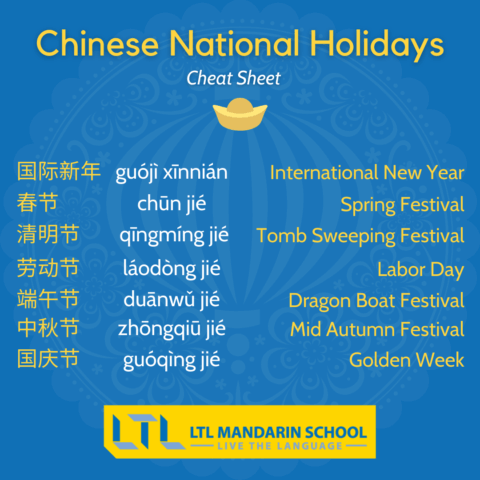
Chinese Holidays | Chinese Holidays in 2024
Chinese Holidays | Chinese Holidays in 2025
Chinese Holidays | How do Chinese Holidays Work?
Chinese Holidays | 2024 & 2025 Taiwan National Holidays
Chinese Holidays | Chinese Holidays at LTL
Chinese Holidays | How Does China Celebrate Holidays?
Chinese Holidays | FAQ’s
CHINESE NATIONAL HOLIDAYS 2025
| Dates | Holiday | Chinese name |
|---|---|---|
| 1st January 2025 | International New Year | 元旦 yuándàn |
| From January 29th to February 4th 2025* | Chinese New Year | 春节 chūnjié |
| 4th April 2025 | Qing Ming Jie | 清明节 qīngmíng jié |
| From May 1st to May 2nd 2025** | Labor Day | 劳动节 láodòng jié |
| From May 31st to June 2nd 2025 | Dragon Boat Festival | 端午节 duānwǔ jié |
| 6th October 2025 | Mid-Autumn Festival | 中秋节 zhōngqiū jié |
| From October 1st to 6th 2025*** | Golden Week | 国庆节 guóqìng jié |
Make up days:
- * Chinese New Year – Sunday 26th January 2025 & Saturday 8th February 2025
- ** Labor Day – Sunday 27th April
- *** Mid-Autumn Festival & National Day – Sunday 28 September & Saturday 11 October
Others Holidays & Observed Dates in 2025
| Dates | Holidays & Observance Days | Chinese name |
|---|---|---|
| 12 February 2025 | Lantern Festival | 元宵节 yuánxiāo jié |
| 1 March 2025 | Zhonghe Festival | 中和节 zhōng hé jié |
| 8 March 2025 | International Women’s Day | 妇女节 fùnǚ jié |
| 4 May 2025 | Youth Day | 青年节 qīngnián jié |
| 1 June 2025 | Children’s Day | 儿童节 értóng jié |
| 1 August 2025 | Army Day | 建军节 jiàn jūn jié |
| 29 August 2025 | Chinese Valentine’s Day | 七夕 qīxì |
| 6 September 2025 | Ghost Festival | 鬼节 guǐ jié |
| 10 September 2025 | Teacher’s Day | 教师节 jiàoshī jié |
| 29 October 2025 | Double Ninth Festival | 重阳节 chóngyáng jié |
| 11 November 2025 | Single’s Day | 双十一 shuāng shíyī |
CHINESE NATIONAL HOLIDAYS 2026
| Dates | Holiday | Chinese name |
|---|---|---|
| 1st January 2026 | International New Year | 元旦 yuándàn |
| From 16th to 22nd January 2026 | Chinese New Year | 春节 chūnjié |
| 5th April 2026 | Qing Ming Jie | 清明节 qīngmíng jié |
| 1st May 2026 | Labor Day | 劳动节 láodòng jié |
| 19th June 2026 | Dragon Boat Festival | 端午节 duānwǔ jié |
| 25th September 2026 | Mid-Autumn Festival | 中秋节 zhōngqiū jié |
| From 1st to 6th October 2026 | Golden Week | 国庆节 guóqìng jié |
Others Holidays & Observed Dates in 2026
| Dates | Observed Day | Chinese |
|---|---|---|
| 3rd March 2026 | Lantern Festival | 元宵节 yuánxiāo jié |
| 20th March 2026 | Zhonghe Festival | 妇女节 fùnǚ jié |
| 8th March 2026 | International Women’s Day* | 中和节 zhōng hé jié |
| 4th May 2026 | Youth Day* | 青年节 qīngnián jié |
| 1st June 2026 | Children’s Day* | 儿童节 értóng jié |
| 1st August 2026 | Army Day* | 建军节 jiàn jūn jié |
| 19th August 2026 | Chinese Valentine’s Day | 七夕 qīxì |
| 27th August 2026 | Spirit Festival | 鬼节 guǐ jié |
| 10th September 2026 | Teachers’ Day | 教师节 jiàoshī jié |
| 18th October 2026 | Double Ninth Festival | 重阳节 chóngyáng jié |
| 11th November 2026 | Singles’ Day | 双十一 shuāng shíyī |
Good to know:
- International Women’s Rights Day – observed for half a day by women only.
- Youth Day – observed for half a day by young people aged 14 to 28.
- Children’s Day – observed for a full day by children under 14.
- Army Day – observed for half a day by military personnel on active duty.
CHINESE NATIONAL HOLIDAYS – HOW DO THEY WORK?
Chinese national holidays do not work like in any other country.
So if you really want to understand when people in China have national days off you will have to spend a bit of time trying to understand the system.
This is important because many days that might look like holidays (and are often shown as such on many websites) are in fact not holidays. They are a Saturday or Sunday moved to a week day and in return a weekend will become a normal working day.
China has six national holidays every year: Chinese New Year, Tomb Sweeping Day, Labour Day, Dragon Boat Festival, Mid Autumn Festival and National Holiday.
For Chinese New Year and National Holiday three days off are given. For the other three holidays there is only one day off.
In addition the Chinese government practices a very unique system that aims to create longer consecutive holidays by exchanging work and weekend days.
So sometimes a Saturday or a Sunday might be a normal work day, while a normal work day is given off.
Even though this makes the whole system a bit confusing and nobody enjoys having to work on a Sunday, it is not without merits.
Most Chinese workers do not live in their home towns and are often given very little annual leave. That means for many the only chance to travel home to visit families are these holidays.
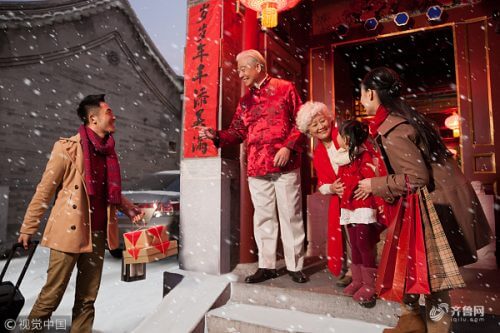
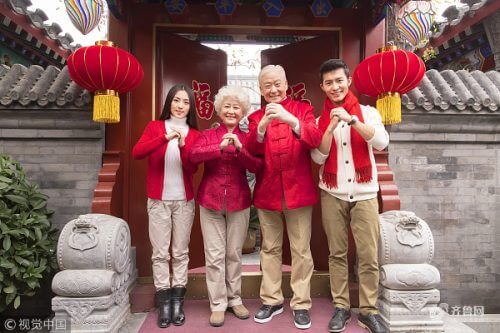
As an example:
1st – 3rd of October (Tue-Thur) are national holidays
Sunday the 29th of Sep. and Saturday 12th of October are declared working days
In return Friday the 4th and Monday the 7th of October are given off
This creates a consecutive holiday of seven days from Tuesday the 1st of October until Monday the 7th of October.
- If a holiday falls on a weekend, the following Monday is given off instead.
- The government re-interprets rules on how work and weekend days should be interchanged every year and on a very short term basis. Usually the exact holiday guidelines are only release one to two months before the actual holiday takes place.
- Except Labour Day and National Holiday, Chinese holidays follow the lunar calendar and are on a different date each year.

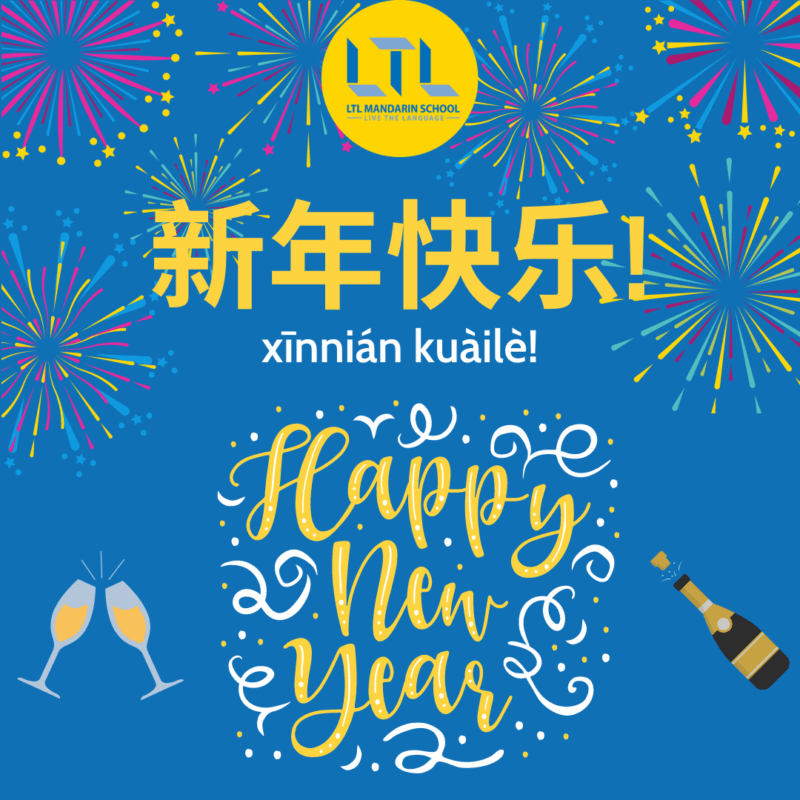
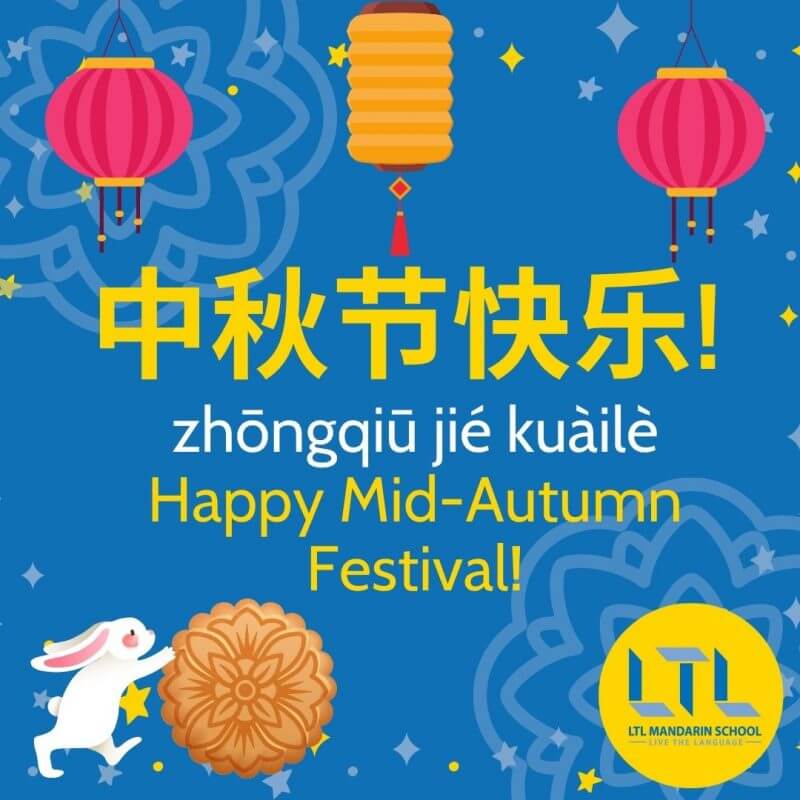
WHAT ABOUT HOLIDAYS IN TAIWAN?
Taiwan Holidays follow a slightly different pattern, but in general they are similar.
For a full guide on Holidays in Taiwan visit our Taiwan School website, but for a quick and easy rundown the holidays are listed below:
2025 TAIWAN NATIONAL HOLIDAYS
| Dates | Holidays | Traditional characters |
|---|---|---|
| 1 January 2025 | International New Year | 元旦 yuándàn |
| From 28 January to 2 February 2025 | Lunar New Year | 春節 chūnjié |
| 28 February 2025 | Peace Memorial Day | 228 和平紀念日 hépíng jìniàn rì |
| 4 April 2025 | Children’s Day | 兒童節 értóng jié |
| 5 April 2025 | Qing Ming Jie | 清明節 qīngmíng jié |
| 1 May 2025 | Labor Day | 勞動節 láodòng jié |
| 30 & 31 May 2025 | Dragon Boat Festival | 端午節 duānwǔ jié |
| 6 October 2025 | Mid-Autumn Festival | 中秋節 zhōngqiū jié |
| 10 October 2025 | ROC National Day | 國慶日 guóqìng rì |
2026 TAIWAN NATIONAL HOLIDAYS
| Dates | Holidays | Traditional characters |
|---|---|---|
| 1st January 2026 | New Year’s Day | 元旦 yuándàn |
| From 16th to 21st January 2026 | Lunar New Year Holiday | 春節 chūnjié |
| From 27th to 28th February 2026 | 228 Peace Memorial Day | 228 和平紀念日 hépíng jìniàn rì |
| From 3rd to 4th April 2026 | Children’s Day | 兒童節 értóng jié |
| 5th April 2026 | Qing Ming Festival | 清明節 qīngmíng jié |
| 1st May 2026 | Labour Day | 勞動節 láodòng jié |
| 19th June 2026 | Dragon Boat Festival Holiday | 端午節 duānwǔ jié |
| 25th September 2026 | Mid-Autumn Festival | 中秋節 zhōngqiū jié |
| 10th October 2026 | National Day | 國慶日 guóqìng rì |
This is an estimate. All dates need to be officially confirmed.
CHINESE NATIONAL HOLIDAYS AT LTL
LTL Mandarin School runs all year, including Christmas and Chinese New Year meaning you can learn Chinese 365 days of the year at LTL.
You will never lose any classes you paid for because of a holiday.
However, if your teacher travels home during a holiday, your classes might have to be moved to other days before or after the holiday.
So especially during longer holidays like Chinese New Year and National Holiday be prepared that there might be some changes to your schedule.
HOW DOES CHINA CELEBRATE HOLIDAYS?
Here’s a quick rundown on how Chinese people celebrate the big days in the calendar. We also take a look at how Christmas is celebrated in China.
New Year’s Day
It’s not typical of Chinese culture to celebrate the International New Year, it is generally treated as a day off work.
However, in big cities such as Beijing or Hong Kong, you can expect to enjoy a big firework display and other such celebrations.
Much like in Western culture, families, friends and colleagues will celebrate together to enjoy this national holiday.
Chinese New Year
The big one, the biggest holiday of all in China
Falling on the 1st day in the 1st Lunar month, Chinese New Year is usually in January or February. This is China’s largest festival celebrated throughout the country. It is the longest public holiday in China.
Chinese people usually return to their hometowns, meaning large cities such as Beijing and Shanghai are often left empty (or at least more empty than usual).
It is typical at these times for people to eat dumplings and spend time with family and extended family.
There are lots of fireworks set off during the lead up to this Chinese national holiday, climaxing on New Year’s Day.
In recent years in the middle of big cities, for example Beijing, the setting off of fireworks has been banned due to noise pollution and safety.
See below for some pictures of our students and their homestay families celebrating!
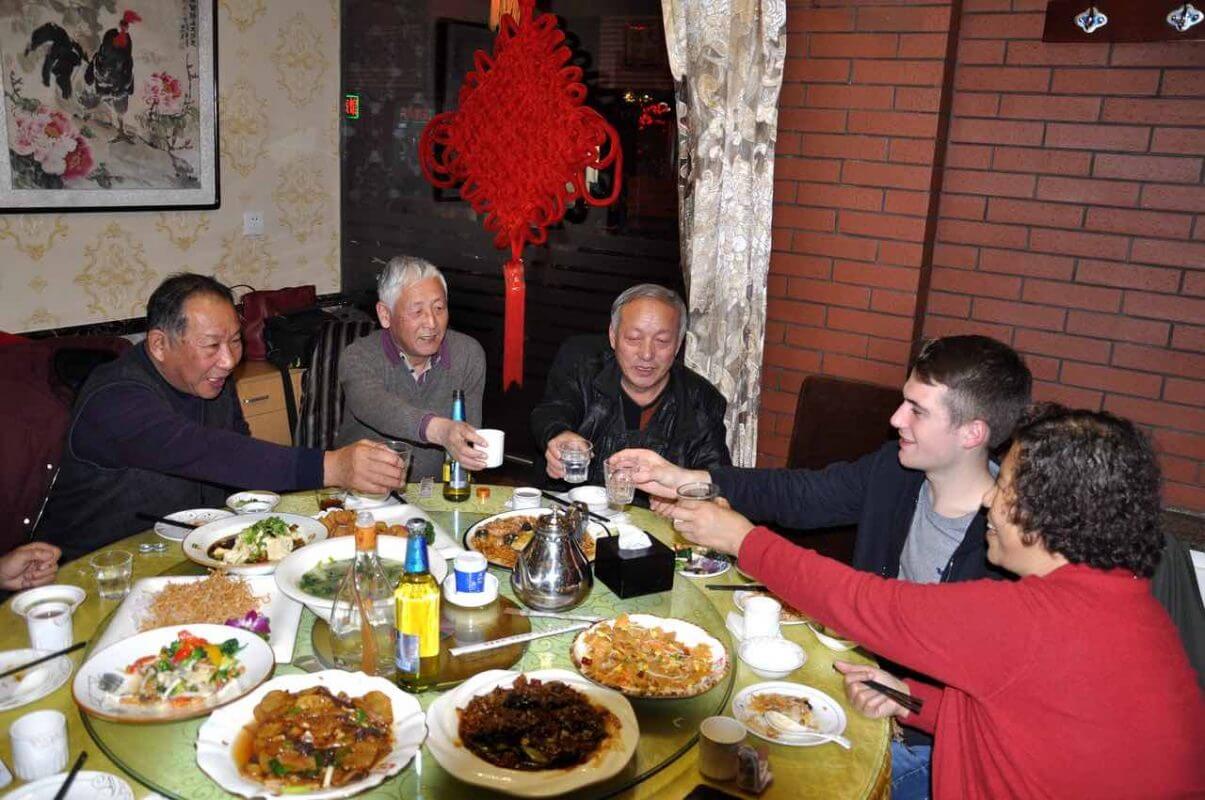
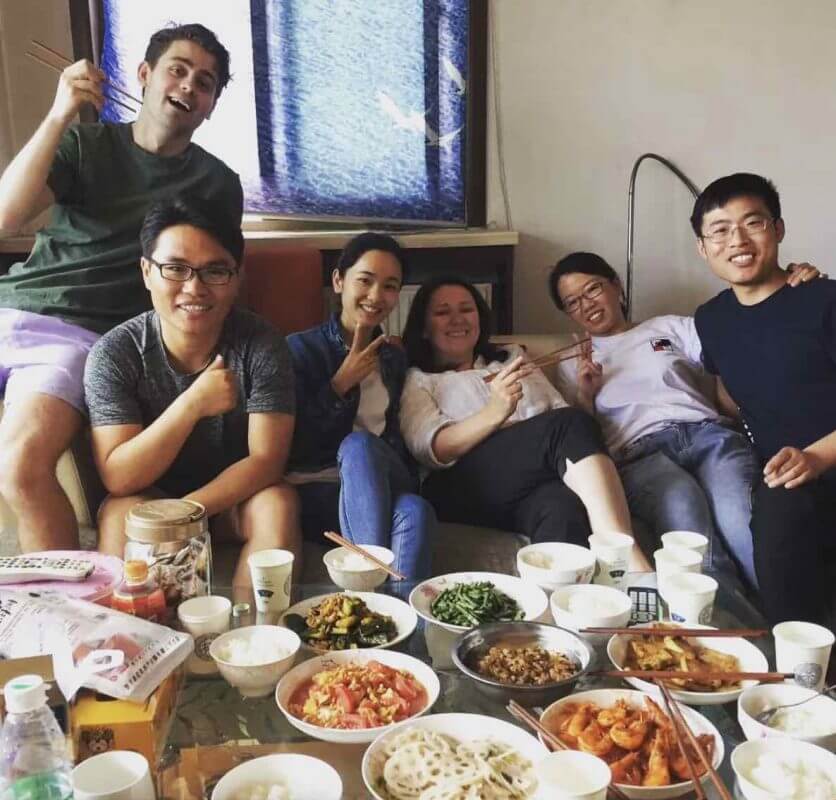
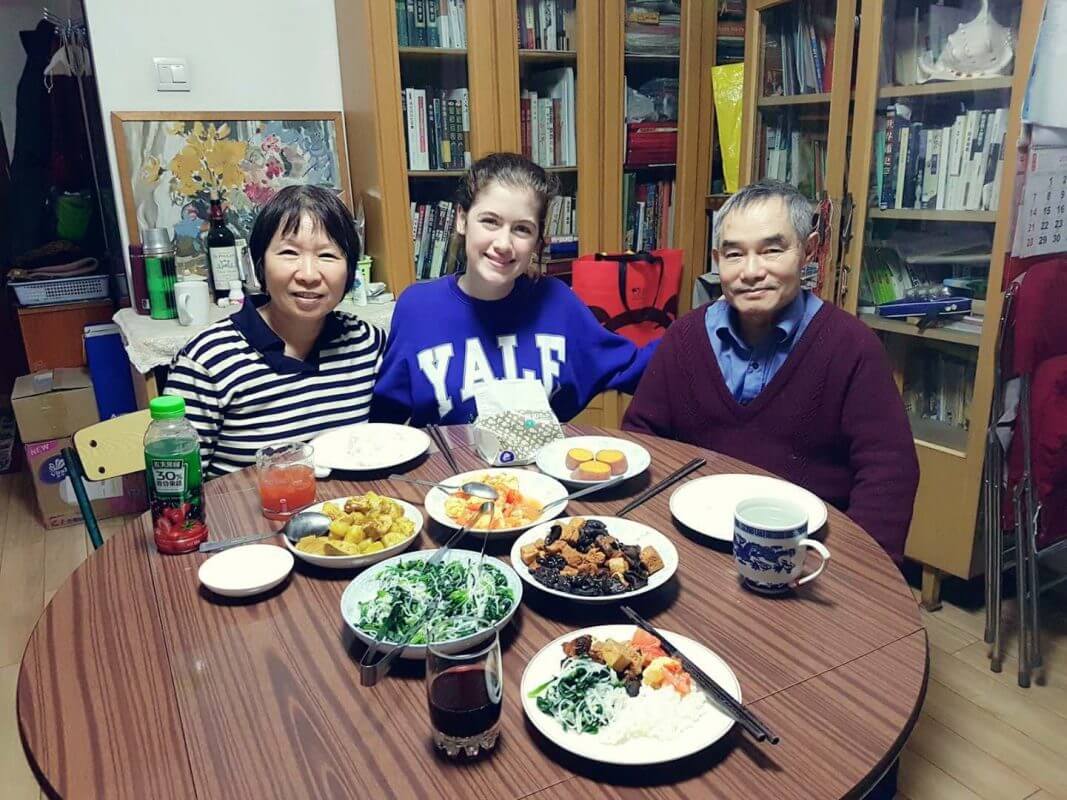
Lantern Festival
The Chinese Lantern Festival falls on the 15th day in the 1st Lunar month, usually in February.
Lanterns will be set off and many people go to watch them fly high in the sky. It is traditional for people to eat sticky rice dumplings.
Children go out at night carrying paper lanterns. It is also common that they then solve riddles on the lanterns.
The origin and significance of the festival are unclear as there are many different possible origins and beliefs.
However, the roots most likely date back over 2000 years ago at the time of Buddhism.
Buddhist monks would light lanterns in the temple of the 15th day of the 1st lunar month, and as a result Emperor Ming of Han, the emperor at the time, ordered all the households and temples at the time to do so. From there, it developed into a custom!
Qingming Festival
Qingming Jie falls on either Apr. 4th or 5th. It is also known as Tomb-sweeping Day, giving an idea of what people get up to on that day.
It is a traditional day to go and visit your family’s ancestors’ tombs.
It is a time spent with family, and people may also go away and go travelling.
May Day
This Chinese national holiday isn’t celebrated with fireworks or a particular kind of food treat, it’s simply a day off work and a time to relax with friends, colleagues, or family.
It’s China’s Labor Day. People may go to the park to hang out together and have food and drinks, and play games.
It is also common for people to go to the park to have a BBQ or to dance and sing together.
Many Chinese people also choose this day to go shopping – so it’s probably not the best day to pick to buy your groceries!
Dragon Boat Festival
The Dragon Boat festival in China falls on the 5th day in 5th lunar month.
The holiday is know is 端午节 (Duānwǔ jié) in Chinese.
This will usually be in June.
Dragon Boat Festival is to commemorate an ancient Chinese patriotic poet Qu Yuan (340-278 BC).
On this day, it is traditional to eat Zongzi, a sticky sweet rice triangle snack.
This Chinese holiday is also celebrated by holding boat races in boats shaped like dragons, hence the name.
Teams of 30 or 60 people paddle wooden dragon shaped boats accompanied by the sound of beating drums.
This is particularly still popular in the South of China.
For some key vocab check out our image here about Dragon Boat Festival.
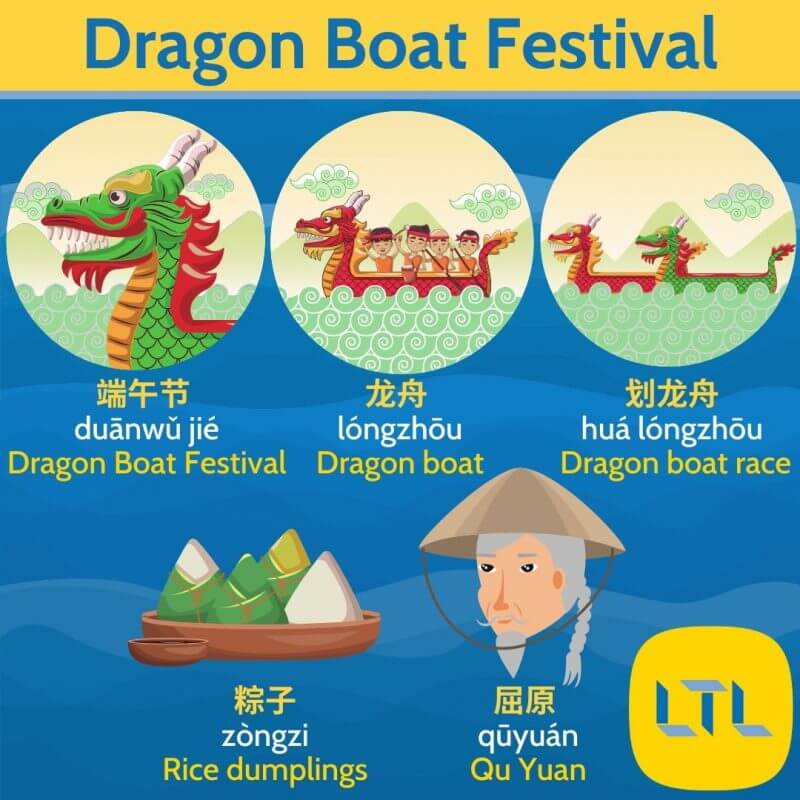
Mid-Autumn Day
Mid-Autumn festival falls on the 15th day in 8th lunar month, usually in September.
Chinese people spend this time with the family, heading back to their hometown if it’s not too far and holding family reunions.
This is the time of year when you will get sick of eating the popular Mid-Autumn Festival snack – the mooncake.
In fact, if you manage to get through the festival without eating any, it’s pretty impressive. They are usually sweet, with a soft pastry outside and a smooth filling. The filling is usually sweet.
However, be warned. There are some weird flavours of mooncakes around, and the amount is increasing every year. Don’t trust any of your Western friends who give you a mooncake.
Chances are they want to see your reaction whilst biting into a sweet pastry filled with spicy beef, or it’s a cake they received from a Chinese friend that they don’t like the flavour of.
DID YOU KNOW – Some Vietnamese National Holidays have a cross over with the Chinese Holidays? Find out more in our blog post about Vietnam’s Public Holidays here.
National Day
Golden Week in China is generally celebrated by mass travel.
Chinese people head back to their hometowns in Chinese New Year fashion or also travel to different popular tourist attractions in China.
Expect mass travelling during this week. So much so, that it’s best to leave the country or keep yourself locked behind closed doors.
If you have time off and wish to travel too, head to smaller cities if you want to stay in China and stay away from major tourist attractions.
For many Chinese people, this is one of the few times a year they can travel and visit different places around the Middle Kingdom.
A trip to the Great Wall at this time will see you in a crowd of thousands of people – unable to see anything but the head in front of you. If you don’t believe us, have a quick Google. Just don’t do it.
Christmas Day in China
Mainland China doesn’t celebrate Christmas, so there are no Chinese national holidays around the Christmas period. Only Hong Kong and Macao have public holidays for Christmas.
Despite this, the Christmas vibe is big! You’ll find Christmas trees and decorations around all of the shops and shopping centres.
Funnily enough sometimes, the following year in perhaps May, you’ll still see Merry Christmas banners still hanging from certain buildings, in true China style!
Shopping becomes particularly popular around this period and retail stores go wild in a bid to get the custom of the Chinese public!


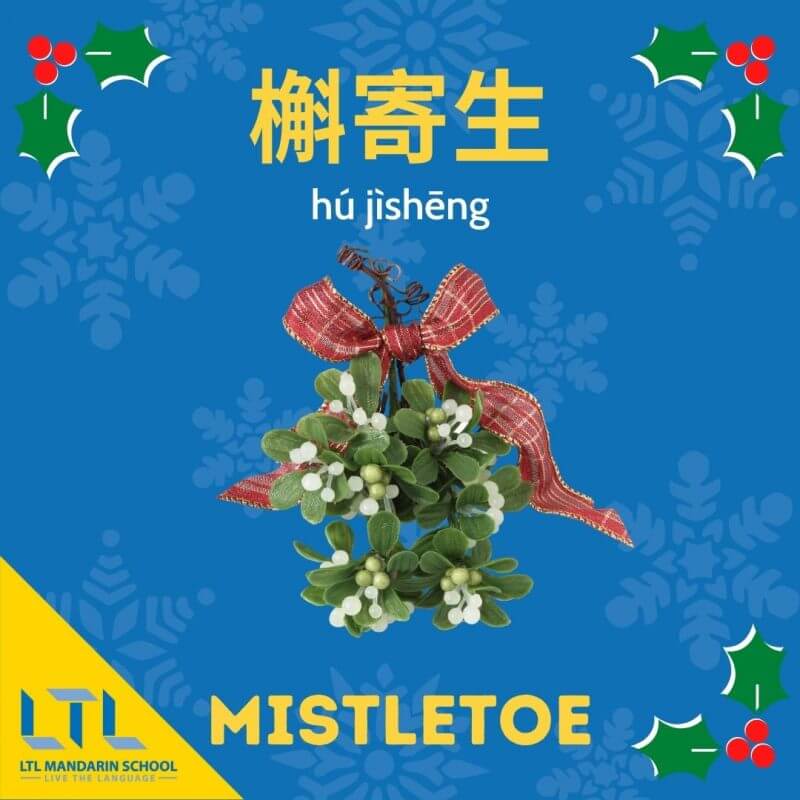
Want to find out more about holidays across Asia?
Why not check out our guides to all the Japanese national holidays, Korean national holidays and Vietnamese national holidays as well.
CHINESE NATIONAL HOLIDAYS – FAQS
Do shops stay open during Chinese Holidays?
Yes.
In fact, Chinese national holidays are unlike a lot of holidays in the West in that shops and attractions are busier and more open than ever!
Many Chinese people travel on Chinese national holidays, especially during the long holidays of National Day and Chinese New Year.
This makes those periods tricky to travel during for Westerners since many tourist attractions are packed with Chinese tourists. Also, prices for food and accommodation get a lot higher.
So, it is strongly recommended NOT to travel during these times.
Do Chinese celebrate Christmas?
No they do not, however despite this, the bigger cities of China will still decorate shopping malls and supermarkets with Christmas Trees and Santa’s.
Although Christmas Day is a working day in China, you will still feel it’s presence somewhat.
Do Chinese celebrate New Year’s Day?
Generally the New Year celebrations for China come when Chinese New Year arrives in January/February (1st day of the Lunar Calendar).
The international New Year is much less significant in China.
What is the most important holiday in China?
Chinese New Year is always the most important.
All Chinese return home to their families and celebrate for the holiday which extends to 7 days using the Chinese holiday system.
Golden Week (October 1st-7th) is another important holiday but this is widely used to travel with family/friends instead of going home.
Is Chinese New Year always the same date?
No, it will change each year.
Typically Chinese New Year would be around the end of January to mid February.
When does “Golden Week” start?
October 1st, which is the National Day of China.

















 Hi, my name is Manuel! I am from Spain and I am a Student Advisor at LTL and I’m based at our Taipei school.
Hi, my name is Manuel! I am from Spain and I am a Student Advisor at LTL and I’m based at our Taipei school. Hi, my name is Mojca! I am from Slovenia in Europe and I work as a student advisor at our Shanghai school.
Hi, my name is Mojca! I am from Slovenia in Europe and I work as a student advisor at our Shanghai school.